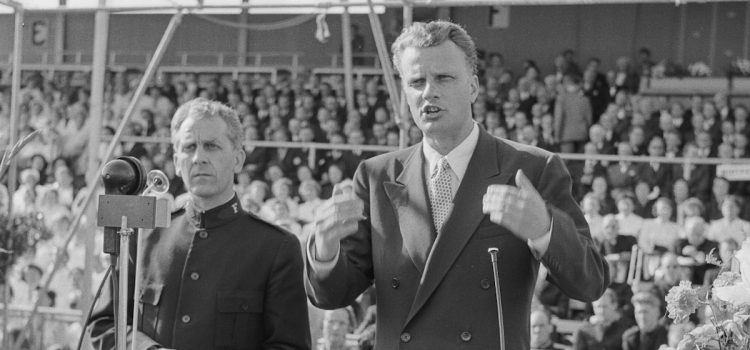
Is any Billy Graham criticism deserved? What feathers has he ruffled?
Billy Graham was a highly effective Christian evangelist who’s admired by many. But, history and gender studies professor Kristin Du Mez has a bone to pick with him. She contends that Graham advocated for militant masculinity.
Keep reading to learn about Du Mez’s criticism of Billy Graham.
Image source: National Archives of Norway, CC BY 4.0 via Wikimedia Commons
Billy Graham Criticism
When it comes to Billy Graham, criticism is in order. That’s the view of Kristin Du Mez, who argues that Graham was the most powerful evangelical force promoting a tough, militaristic masculinity. Graham was an evangelist and minister who started leading evangelical revival movements during WWII. Du Mez writes that he employed war and sports metaphors in his portrayals of Jesus to mass audiences; Graham likened Jesus to a “star athlete,” calling him “our great Commander” and emphasizing his immense physical strength. And, by the end of WWII, Graham had established himself as a preeminent defender of “manly evangelicalism.”
(Shortform note: In terms of sheer reach, Billy Graham was likely the most influential evangelist of all time. According to estimates, his preaching reached an estimated 2.2 billion people worldwide, and over two million people converted to evangelical Christianity during his “crusades”—his evangelical campaigns held in the second half of the 20th century.)
According to Du Mez, Graham’s emphasis on militaristic masculinity stretched beyond WWII and into the Cold War—the tension between the US and the communist Soviet Union that began in the late 1940s. She notes that, in Graham’s rallies, he portrayed communism as an evil force driven by the devil that threatened to annihilate the world via nuclear weapons. In turn, Graham exhorted evangelical men to protect their nation by fighting the Soviets in battle if necessary but also by maintaining righteous homes to defeat the moral evils of communism.
(Shortform note: Although the perceived threat of communism is less severe in the contemporary US than it was in the ’40s, evangelicals continue to view communism as an evil, godless force. In fact, some evangelicals have even argued that Du Mez herself fails to understand the wicked nature of communism throughout Jesus and John Wayne, allegedly making her scholarship less reliable.)
Graham’s Views on the Vietnam War
According to Du Mez, US participation in the Vietnam War—in which the US faced guerrilla warfare from the communist Viet Cong, which controlled Northern Vietnam—further entrenched the militant evangelical conception of masculinity.
Du Mez argues that, during the Vietnam War, evangelicals made excuses for atrocities perpetrated by US soldiers. For example, Lieutenant William Calley was found guilty of murdering 22 innocent Vietnamese civilians during the My Lai massacre—an episode in which US soldiers murdered around 500 Vietnamese villagers during the war. However, Du Mez asserts that Billy Graham downplayed these atrocities. Graham commented that the Viet Cong had likely also committed war crimes and even noted in The New York Times that “We have all had our Mylais in one way or another, perhaps not with guns, but we have hurt others with a thoughtless word, an arrogant act or a selfish deed.”






